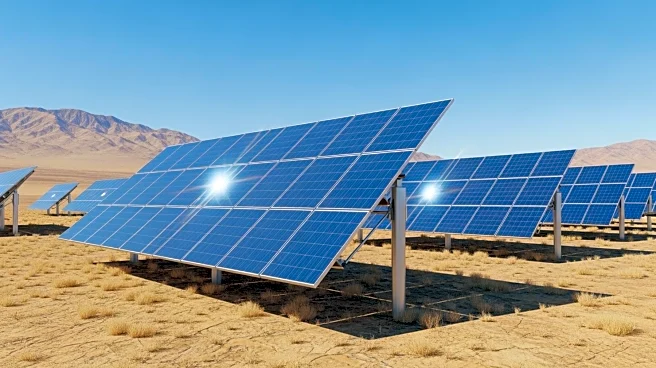What's Happening?
Reliance Industries is set to begin solar power generation in the first half of the next financial year from its expansive renewable energy project in Kutch, Gujarat. This project, which spans an area
nearly three times the size of Singapore, is part of the conglomerate's strategic shift towards clean energy and its goal of achieving net-zero carbon emissions by 2035. The development of the 550,000-acre site is progressing well, with engineering and feasibility studies completed. The site is currently undergoing various stages of land development. The project is expected to start commissioning solar generation for captive requirements and green fuels production. This initiative is a continuation of Reliance's $10 billion investment in a 'new energy' business announced four years ago, marking a significant pivot from its traditional petroleum refining operations.
Why It's Important?
The launch of solar power generation by Reliance Industries is a significant step in India's transition towards renewable energy. As one of the largest conglomerates in the country, Reliance's commitment to clean energy could influence other major players in the industry to follow suit, potentially accelerating the adoption of sustainable practices across the sector. This project not only supports India's national goals for renewable energy but also positions Reliance as a leader in the global clean energy market. The development of such large-scale renewable energy projects can contribute to reducing carbon emissions, promoting energy security, and creating new economic opportunities in the region. Additionally, the project aligns with global efforts to combat climate change by reducing reliance on fossil fuels.
What's Next?
Reliance Industries plans to continue expanding its solar photovoltaic giga-factory, with the commissioning of additional PV module lines and the first cell line expected soon. The company is on track to achieve its targeted capacity and plans to expand further in a modular fashion. The solar manufacturing chain will include the production of polysilicon, ingot and wafer creation, which are essential components of solar cells. Reliance has also pledged to produce 3 million tonnes per annum of green hydrogen by 2032, while manufacturing equipment like electrolysers, battery storage, and solar panels in-house. These developments are expected to enhance Reliance's capabilities in the renewable energy sector and contribute to its long-term sustainability goals.








